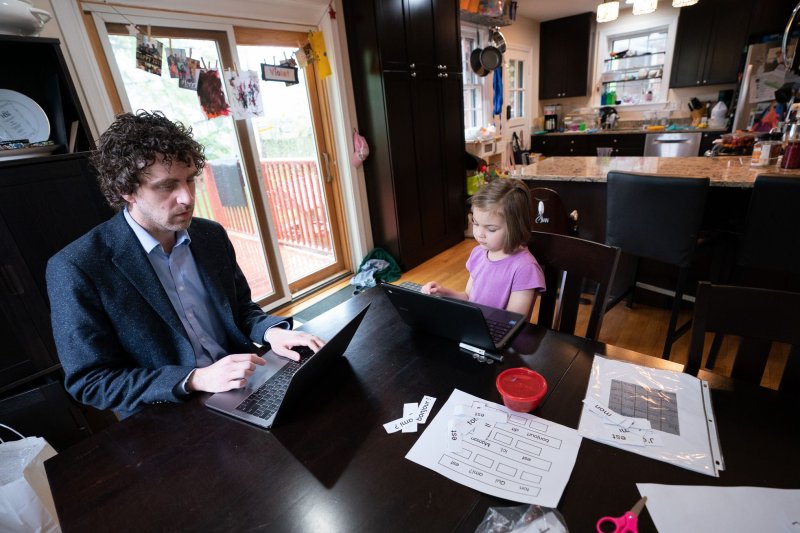
Economist Gray Kimbrough works at home in April 2020 alongside his daughter Violet, who was participating in distance learning from her school. New research suggests that entirely home-based workforces can limit communication and collaboration that comes from being together in an office.
File Photo by Kevin Dietsch/UPI | License Photo
Sept. 9 (UPI) -- When employees work remotely, lines of communication between colleagues, teams and departments get severed, according to new research.
The study of 61,000 Microsoft employees -- published Thursday in the journal Nature Human Behavior -- found remote work led to more siloed lines of communication and fewer real-time conversations.
While working remotely full-time, employees were also less likely to spend time in meetings, limiting the opportunity for collaboration and information-sharing.
"Measuring the causal effects of remote work has historically been difficult, because only certain types of workers were allowed to work away from the office," study co-author David Holtz said in a press release.
"That changed during the pandemic, when almost everyone who could work from home was required to do so," said Holtz, an assistant professor at the University of California's Berkeley Haas School of Business.
With entire workforces relegated to the home office, researchers were able to able to measure changes in behavior.
For the study, Holtz and his research partners analyzed anonymized data from thousands of emails, instant messages, calls, meetings and working hours logged by Microsoft employees. All of the content and identifying information were scraped from the messages before being analyzed.
In addition to communication data, researchers had access to data on employees' roles, managerial status, business group and length of tenure at the company.
Researchers analyzed the volume and trajectory of messages -- calls, texts and emails -- across different groups of employees. The research team also tracked the time employees spent in scheduled and unscheduled meetings.
The data showed communication networks shrunk when the workforce began operating remotely, with fewer calls, emails, texts and meetings between different teams and departments. Researchers determined cross-group collaboration declined by 25%.
However, researchers found communication within groups happened more frequently. Predictably, higher volumes of texts and emails were responsible for increases in in-group communication, as colleagues spent less time on the phone or in video conferences while working form home.
Because roughly 15% of the Microsoft's workforce was remote prior to the pandemic, researchers were able to isolate the the effects of working from home and working with remote colleagues.
"The fact that your colleagues' remote work status affects your own work habits has major implications for companies that are considering hybrid or mixed-mode work policies," Holtz said.
Having one's teammates and collaborators in the office at the same time, for example, can improve communication and information flow for people who are in the office, as well as those working remote, he said.
"It's important to be thoughtful about how these policies are implemented," Holtz said.
Sept. 9 (UPI) -- When employees work remotely, lines of communication between colleagues, teams and departments get severed, according to new research.
The study of 61,000 Microsoft employees -- published Thursday in the journal Nature Human Behavior -- found remote work led to more siloed lines of communication and fewer real-time conversations.
While working remotely full-time, employees were also less likely to spend time in meetings, limiting the opportunity for collaboration and information-sharing.
"Measuring the causal effects of remote work has historically been difficult, because only certain types of workers were allowed to work away from the office," study co-author David Holtz said in a press release.
"That changed during the pandemic, when almost everyone who could work from home was required to do so," said Holtz, an assistant professor at the University of California's Berkeley Haas School of Business.
With entire workforces relegated to the home office, researchers were able to able to measure changes in behavior.
For the study, Holtz and his research partners analyzed anonymized data from thousands of emails, instant messages, calls, meetings and working hours logged by Microsoft employees. All of the content and identifying information were scraped from the messages before being analyzed.
In addition to communication data, researchers had access to data on employees' roles, managerial status, business group and length of tenure at the company.
Researchers analyzed the volume and trajectory of messages -- calls, texts and emails -- across different groups of employees. The research team also tracked the time employees spent in scheduled and unscheduled meetings.
The data showed communication networks shrunk when the workforce began operating remotely, with fewer calls, emails, texts and meetings between different teams and departments. Researchers determined cross-group collaboration declined by 25%.
However, researchers found communication within groups happened more frequently. Predictably, higher volumes of texts and emails were responsible for increases in in-group communication, as colleagues spent less time on the phone or in video conferences while working form home.
Because roughly 15% of the Microsoft's workforce was remote prior to the pandemic, researchers were able to isolate the the effects of working from home and working with remote colleagues.
"The fact that your colleagues' remote work status affects your own work habits has major implications for companies that are considering hybrid or mixed-mode work policies," Holtz said.
Having one's teammates and collaborators in the office at the same time, for example, can improve communication and information flow for people who are in the office, as well as those working remote, he said.
"It's important to be thoughtful about how these policies are implemented," Holtz said.
No comments:
Post a Comment